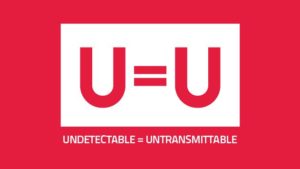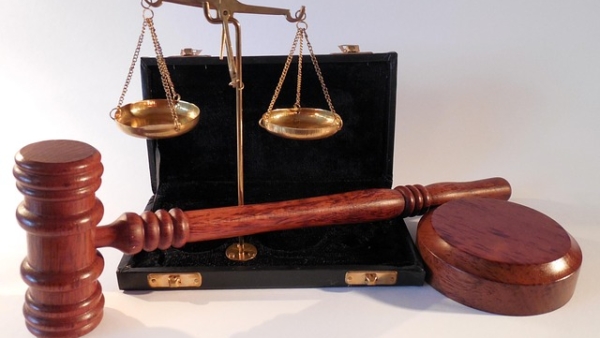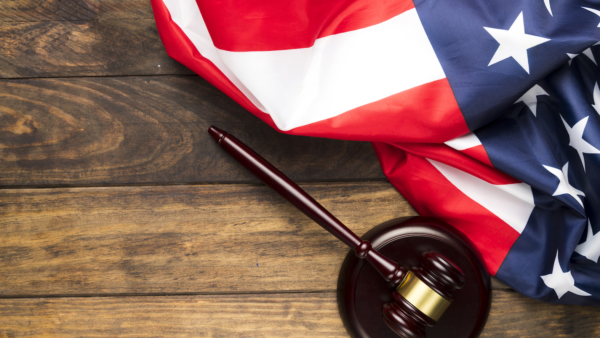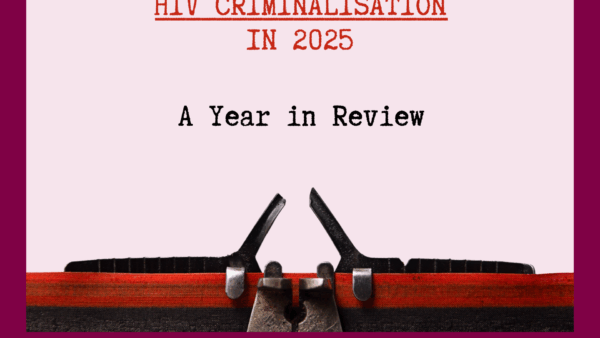Michael Johnson, HIV Disclosure, and the Coercive Nature of Plea Bargains
On Sept. 21, 2017, Michael Johnson, a former college wrestler, entered a no-contest plea in the St. Charles Circuit Court in Missouri. He was sentenced to 10 years in prison, which includes time served for the four years he has already spent behind bars.
As readers might remember, Johnson was arrested in 2013 and charged with non-disclosure of his HIV status to six sexual partners. Johnson said that he had disclosed; the prosecution argued that he hadn’t and that one of Johnson’s partners later tested positive for HIV.
In a trial rife with racism and homophobia, the young black gay college student was convicted and sentenced to 30 years in prison. He appealed and, in April 2017, the state supreme court upheld his right to a new trial.
However, Missouri’s laws around HIV non-disclosure are among the harsher in the country. Under the state’s statute, originally passed in 1988 and made harsher in 1997 and 2002, HIV non-disclosure before sex is a felony. So is HIV transmission. It doesn’t matter whether a condom was used; what matters is whether defendants can prove that they told their partner before having sex.
If he had taken his chances at a new trial, Johnson risked a 100-year prison sentence if another jury of twelve found him guilty.
Johnson’s experience, complete with the threat of a century in prison, might seem shocking, but the reality is that plea bargains are extremely common.
Plea Bargains: An Everyday Occurrence
Nearly all felony convictions — 94% at the state level and 97% at the federal level — are the result of plea bargains.
This has even been acknowledged by the U.S. Supreme Court, coincidentally in a case that originated in Missouri. In August 2007, college student Galin Frye was arrested and charged with driving with a revoked license. Because he had been convicted of the same offense three times before, the state of Missouri charged him with a class D felony, which carried a maximum sentence of four years. Three months later, the prosecutor sent Frye’s attorney a letter offering two plea bargains. If Frye pled guilty to the felony charge, the prosecutor would recommend that Frye serve only 10 days of a three-year sentence. This still meant that Frye would be saddled with a felony record (and have to spend 10 days in jail). The second offer reduced the charge to a misdemeanor, which carried a maximum sentence of one year behind bars; the prosecutor would recommend that Frye serve only 90 days. These offers, the letter continued, would expire on Dec. 28, one week before Frye’s Jan. 4 court hearing.
But Frye’s attorney didn’t bother to tell his client about the letter or the plea offers. Two days after the offer had expired, on Dec. 30, 2007, Frye was again arrested for driving with a revoked license. Frye pled guilty and, though the prosecutor requested 10 days in jail, the judge sentenced Frye to three years in prison. It was only after he had been sentenced that Frye learned about these plea offers. He filed for post-conviction relief, arguing that, had his attorney told him about the letter, he would have accepted the misdemeanor plea bargain.
His case made it to the Supreme Court, which, in 2012, sided with him. Writing for the majority, Justice Anthony Kennedy acknowledged the overwhelming significance of the plea bargain: “‘[H]orse trading [between prosecutor and defense counsel] determines who goes to jail and for how long. That is what plea bargaining is. It is not some adjunct to the criminal justice system; it is the criminal justice system.'” But, by the time the decision was issued, Frye had already served his sentence.
When he was arrested in 2013, a year after the Missouri v. Frye decision, Michael Johnson had no prior criminal record. However, he was a black gay man being tried in St. Charles, a county that is 90% white and among the country’s top 100 conservative counties. During his summation, the prosecutor freely admitted to intentionally including prospective jurors who considered gay sex a sin. The jury deliberated for just over two hours before convicting Johnson of five of the six counts and recommended 30 years in prison.
“Pleas Are the Norm and Trials Are Not”
Even those facing charges for the first time have a high incentive to accept a plea rather than wait (and wait and wait) for their constitutional day in court.
Mariame Kaba is the director and founder of Project NIA, a nonprofit organization based in Chicago that works toward ending youth criminalization and incarceration. She told TheBody.com that in her years working with criminalized youth, less than a quarter of those facing criminal charges have ever taken their case to trial. “Pleas are the norm,” she said, “Trials are not.” The threat hanging over each defendant’s head is that, if he or she exercises the constitutional right to a trial and loses, the prosecutor will demand the highest possible penalty. If people plea bargain, they can receive a more lenient sentence.
In 2009, Robert Suttle pled guilty to HIV non-disclosure. In Louisiana, where Suttle had been arrested and was facing trial, intentional exposure to HIV carries a possible ten-year prison sentence. When his attorney told him that he could plead guilty and instead serve two years of probation, he decided to do just that. “They already have evidence that you are HIV positive,” he explained to TheBody.com. “You know your status, which shouldn’t be a crime, but the burden is on you to prove that you did disclose.” Facing the chance that a guilty verdict would mean a decade in prison, Suttle opted for what he felt was the lesser punishment.
Like many defendants, Suttle was never in the room when his attorney and the prosecutor hashed out a possible plea bargain. In fact, he told The Body, he had already started working in another state by the time his attorney and the prosecutor began negotiations.. It was only after pleading guilty that he learned that he would not only spend two years on probation, but also six months behind bars and 15 years on the sex offender registry. “I pled to something not fully understanding the implications,” he reflected.
But it’s not simply the threatened sentence that pushes many towards plea bargains. Kaba noted that many youth, particularly those who are low-income youth of color, are assigned bail amounts that their families cannot afford, which results in them spending lengthy amounts of time in jail as they await their day in court. “And,” Kaba added, “Jail is hellish.” In addition, more often than not, they’re assigned public defenders who are overloaded with other cases and unable to provide any shadow of time-intensive, let alone zealous, representation.
At the same time, the hammer of the criminal justice system doesn’t fall equally on everyone. “Race is involved in the criminal punishment system at every level,” Kaba reminded TheBody.com. Black people are up to ten times more likely to be arrested than people of other ethnicities. Black people are also 10% more likely than whites to be either remanded to jail before trial or unable to afford bail; they are also more likely to be offered pleas involving incarceration rather than probation.
HIV criminalization follows that same pattern. The Williams Institute found that, in California, white men were significantly more likely to be released without charge (61% of HIV-specific criminalization cases). But black men, while making up 14% of people living with HIV in California, made up nearly one-fifth (19%) of those criminalized because of their HIV status. The disproportion for black women was even higher: Though they are only 4% of the state’s population living with HIV, they make up 21% of those who have had contact with the criminal justice system because of their status.
As reported previously, HIV criminalization has long been used as a prosecutorial threat, even if HIV-specific charges are never filed in court. In New Orleans, Women With a Vision organizes with low-income African-American women, many of whom are living with HIV. Policy director Nia Weeks, who previously worked as a public defender, noted that the city’s district attorney often threatens to upcharge (or increase criminal charges) or to use the state’s habitual offender laws to coerce people to plead guilty.
Race and Place Matter
When considering whether to take a chance at trial or to accept a plea bargain, race and place matter.
Kaba of Project NIA has co-founded campaigns to support abuse survivors criminalized for self-defense. She points to the case of Ky Peterson, a black trans man incarcerated in Georgia for shooting the man who raped him. When he was taken to a clinic for a rape exam, the woman conducting the exam told him that he didn’t look like a rape victim. The police and prosecutors didn’t believe him either, instead accusing Peterson, whom they assumed to be a woman, of luring the man into a trailer with promises of sex and setting him up to be robbed by his brothers.
After a year in jail, Peterson signed a plea agreement for what he thought was involuntary manslaughter and a ten-year sentence. (According to the court transcripts, however, Peterson actually pled guilty to voluntary manslaughter and was sentenced to 20 years.) “He knew that people were not going to believe him, that as a black trans man he was raped,” Kaba stated.
But it’s not just race and place. There’s also understanding — or a lack of understanding — about HIV. Suttle, a black man living in Shreveport, Louisiana, recalled that the prosecutor in his case was a black woman; the judge was a black man. “We have people in places of power prosecuting people based on their limited knowledge of HIV: that it is a death sentence,” he explained. At the same time, he recalled, he didn’t know anything about HIV criminalization — or resources to help him fight the charges. “People now have resources — the Sero Project, the Center for HIV Law and Policy, advocates to consult with, opportunities to reach out and get more information rather than relying on courts to be fair,” he reflected. At the same time, he realizes that many people remain unaware that such resources exist and, like him, sit in court feeling alone and desperate. “That means there’s a lot more work for us to do,” he said.
In Missouri, with the threat of a 100-year sentence hanging over his head, Michael Johnson, a black gay man living with HIV, might also have feared that a jury would not believe him.
“It takes a lot here for people to be open about their HIV status,” said Devin Hursey, a member of the steering committee for the U.S. People Living With HIV caucus and a member of the Missouri HIV Justice Coalition. Hursey lives in Kansas City, a three-hour drive across the state from St. Charles, where Johnson was tried and convicted. “Prevention workers are very progressive, but the average Missourian, unless they know about public health and the way that HIV is transmitted, is not.”
Hursey, now age 27, still remembers learning about HIV in 7th grade when the Dramatic Health Education Project through the Coterie Theater performed at his junior high. “They did two monologues,” he recounted. “The actors told stories of people living with HIV.” But, he acknowledges, that particular learning experience doesn’t happen in every school.
Symptoms of the System
The white, conservative suburb of St. Charles is approximately 15 miles from the suburb of Ferguson, where the police killing of 18-year-old Michael Brown sparked protests both locally and nationwide. St. Charles is also less than 25 miles from St. Louis, where police officer Jason Stockley was recently acquitted in the 2011 fatal shooting of Anthony Lamar Smith. His acquittal triggered weeks of protest, which were often met by police violence.
Not that Missouri’s racial tensions are restricted to St. Louis and its suburbs, Hursey reminded TheBody.com. Last year, the state passed a law allowing prosecutors to charge schoolchildren, regardless of age, with a class E felony for a school fight in which someone is injured. Class E felonies carry a penalty of up to four years in prison. Missouri already has a high suspension rate — and the highest racial disparity among suspensions in the nation. During the 2011 to 2012 school year, the state suspended 14.3% of its black elementary schoolchildren at least once; in contrast, only 1.8% of white schoolchildren were suspended. Missouri elementary schools go from kindergarten to fifth grade, meaning that their students range from ages five to ten.
For Michael Johnson, pleading guilty means that parole is his next hope of an earlier release. But parole practices in Missouri have long been fraught with opportunities for parole board members to humiliate prisoners seeking early release. One parole commissioner, who was particularly known for humiliating and intimidating parole applicants, has since resigned, but Johnson will still face an uphill battle not only to obtain parole but also not to be returned to prison for a petty parole violation.
As they regroup and plan to continue supporting Johnson, HIV activists recognize that the struggle doesn’t end with Johnson or even the repeal or modernization of HIV criminalization statutes. Charles Stephens, executive director of the The Counter Narrative Project, which advocates around issues that impact black gay men, told TheBody.com: “Racist sentencing practices in the criminal justice system have been a key tactic in the practice of white supremacy throughout history. Michael Johnson is very much a victim of this system. We must continue to recognize that the struggle against HIV criminalization is also connected to the struggle against mass incarceration and racism.
Victoria Law is a freelance writer and editor. Her work focuses on the intersections of incarceration, gender and resistance. She is the author of Resistance Behind Bars: The Struggles of Incarcerated Women. You can find more of her work at Victorialaw.net.









